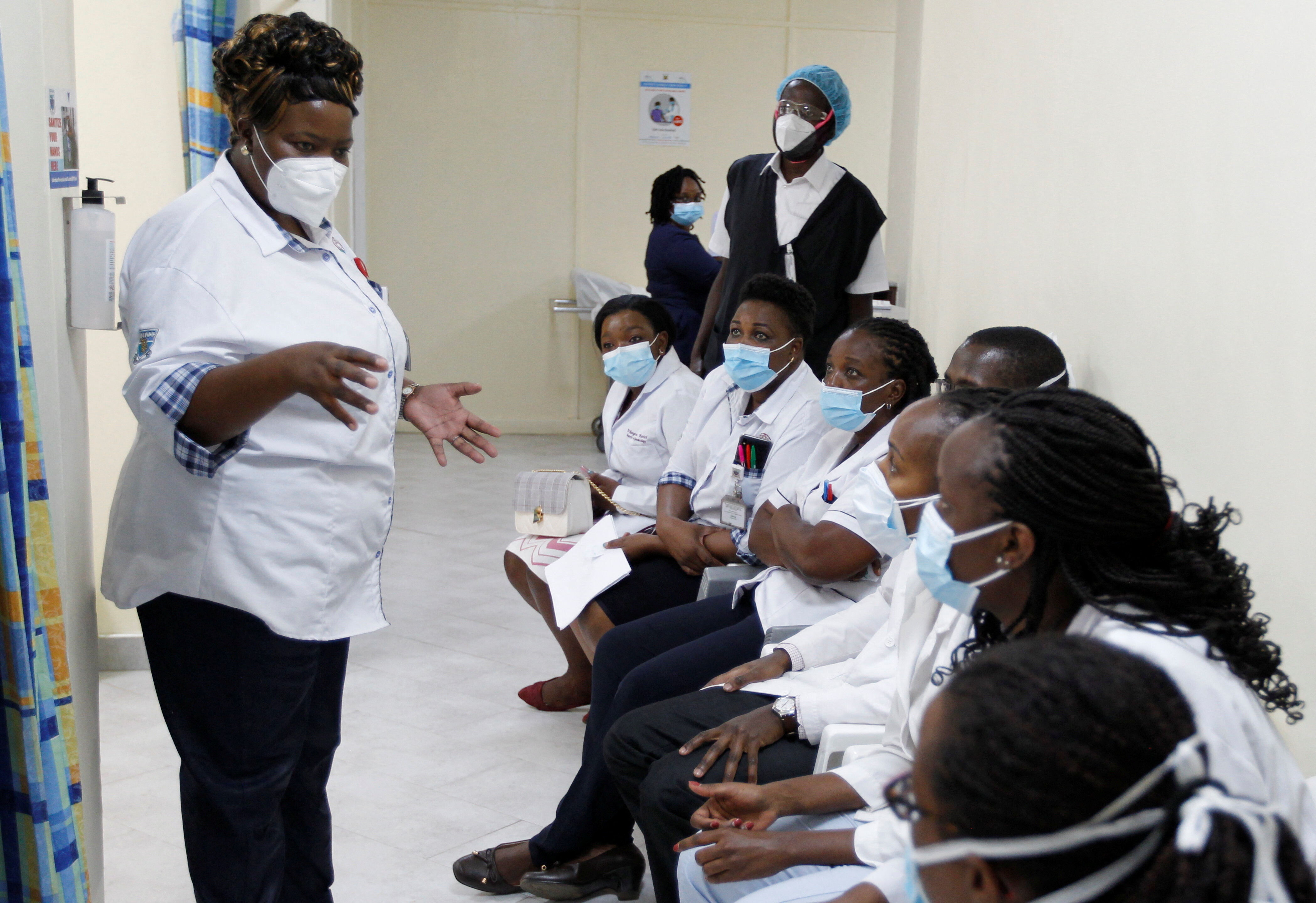How COVID-19 has affected international labour migration – and the path to enduring reintegration

Migrant workers need greater economic and social protections – here's how governments can help. Image: REUTERS/Amit Dave TPX IMAGES OF THE DAY - RC2RBH9F7GLD
- The COVID-19 pandemic has devastated international labour migration, including migrant remittances and employment.
- Now more than ever, migrant workers need greater economic and social protections and advocacy.
- A policy ecosystem that supports migrant savings and investments is essential.
The COVID-19 pandemic has caused 3 million deaths, as well as lockdowns and shutdowns of markets and industries worldwide. It is triggering a rethinking of international economic and political relationships. It is creating a “new normal” in everything – from classroom education, to international labour migration.
International labour migration has been devastated by the pandemic. We face real and immediate concerns related to the job security and well-being of more than 91 million international migrants from Asia and the Pacific, not to mention those from other regions around the world.
The pandemic has particularly affected migrant remittances, reintegration and employment – here's how governments should respond.
Have you read?
Migration retreat and slip-sliding remittances
An Asian Development Bank (ADB) report finds "total remittances to Asia are expected to drop between $31.4 billion (baseline scenario) and $54.3 billion (worst-case scenario) in 2020, equivalent to 11.5% and 19.8% of baseline remittances, respectively".
With many households in developing Asia depending on international remittances, "a sudden stop in remittance flow to these regions could push people into poverty", the report continues. It will take an even greater effort for returning migrants, remittance banks and host country governments to extend temporary social protection programs to assist stranded or COVID-infected migrants. Governments of returning migrants will be compelled to make enormous local and foreign loans to extend social protection, vaccination and treatment of their whole populations. They will also need to "design comprehensive immigration, health, and labor policies that enable migrants to return to jobs" and "ensure the continuity of remittance services and enabling business environment".
All reintegration programs by migrant support groups and by governments will depend upon the evaluation of their advocacy for migrants according to the laws passed that ensure their protection – if there are any.
The “save and invest” reintegration pathway
The Philippine Overseas Employment Administration (POEA) reports that more than half a million Overseas Filipino Workers (OFW) were displaced by the pandemic in 2020. This was combined with a 75% drop in annual overseas deployment from 2.1 million to .549 million, the lowest in three decades.
But the real impact of COVID-19 can be measured in job losses and the bleak prospects of employment recovery.
How can migrants reintegrate in their home country and economy when the economy has stalled? The experience of returned OFWs who seriously heeded the call for Migrant Savings for Alternative Investments (MSAI), or “save and invest”, is instructive.
MSAI investors in agricultural production and agribusiness who acquired agricultural land were the long-term gainers. During the pandemic, they found themselves responding to the call of government to buttress the food supply. An engineer-mechanic from Saudi Arabia grows his own rice, vegetables and fruits and supplies the Davao-Agusan markets (in Mindanao). Another farmer is a supplier of livestock to the meat market in Cebu.
The losers were those in transportation and travel, restaurants and small retailers. An awardee migrant entrepreneur lost all of her investments in the resort business in Siargao Island, a surfing destination, due to the travel ban and lockdown of business.
But an enduring reintegration is not always governed by choice of sector. Agriculture is the most neglected sector in the Philippines, which is why there is a great deal of unemployment in it. At the same time, it is the sector least affected by the pandemic, because it feeds the people. While there were job losses in other sectors, there were only actual gains in jobs in agriculture.
With large landholdings concentrated in the hands of a few landowners, government must do more to free alienable, productive land. Migrants have engaged in long, hard labor – often away from their families – to earn, save and build assets. Government must lead migrants back to the fundamentals of an economy: food production, agriculture and agribusiness, starting with food manufacturing. Together with migrants and support organizations, government must reestablish an ecosystem they can identify with. This includes a facilitative policy environment that provides preferential treatment to OFW investments in enterprise registration and taxation, in access to technology and post-harvest support, accessible capital and rational marketing policies and infrastructure.
Agriculture, fisheries, food production, manufacturing and distribution provide the more stable jobs to many of the poor. These fundamental activities should be protected in Developing Asia and Pacific. If so, migration will be a free option – not compulsory for survival. Data supports the migrant savings and investment strategy for reintegration. Where migrants save and invest in agriculture, there is long-term gain.
How policy directly affects migrants and their families: a case study
Rea is a frontline nurse in hospital in New York. Her family owns farmland in a village in Mindanao. The 2-hectare land was mortgaged in 2013 to pay for Rea’s recruitment fees.
Two years ago, just before the pandemic, the loan was finally paid by Rea’s remittances and the land reverted back to the family.
Mely (pictured below with the author) slowly improved the land’s productivity. When COVID-19 began, the Philippines Department of Agriculture increased its support to farmers. As a member of the local farmers’ cooperative, Mely can receive subsidized seeds and other agri-inputs, as well as use the coop’s new harvester for a lower fee.
However, without common storage, drying facilities (solar or mechanical) or a rice mill, the family farm must rely on the local rice miller/trader. Like the rest of the farmers, she does not understand why the price of milled rice from the market is expensive, but the going price of palay (unhusked rice) is cheap. Mely and the rest of the coop members borrow money every planting cycle because their income could not support their needs for the period. This loan usually comes from the miller/trader.
What adds to the price puzzle is the government’s policy to import rice.

The scope and impact of the COVID-19 pandemic compels us to acknowledge ethical and practical problems in the world economy. There must be continuous efforts to encourage governments to be accountable for migrant workers’ suffering due to the pandemic. Advocacy provides an opportunity for anyone, now and in the future, to hold their governments accountable.
Don't miss any update on this topic
Create a free account and access your personalized content collection with our latest publications and analyses.
License and Republishing
World Economic Forum articles may be republished in accordance with the Creative Commons Attribution-NonCommercial-NoDerivatives 4.0 International Public License, and in accordance with our Terms of Use.
The views expressed in this article are those of the author alone and not the World Economic Forum.
Stay up to date:
Migration
Forum Stories newsletter
Bringing you weekly curated insights and analysis on the global issues that matter.
More on Health and Healthcare SystemsSee all
Shyam Bishen
January 29, 2026









